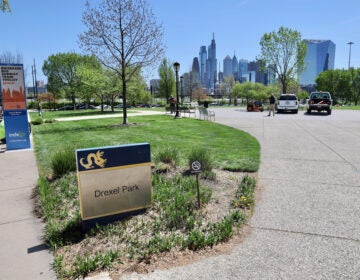Community plans to build rain garden in Vernon Park
Vernon Park in Germantown is scheduled for a little restoration this fall courtesy of the Tookany/Tacony-Frankford Watershed Partnership Inc. and their supporters.
In an effort to improve the appearance of the park and control storm water runoff from the Center in the Park organization roof, organizers are planning a rain garden. Over 30 residents, mostly “stakeholders” of the project packed into First Presbyterian Church on Chelten Ave last Thursday for a presentation about watersheds and rain gardens.
Organizers estimate the proposed Vernon Park rain garden to be only about 1000 sq ft, and will be positioned to capture some of the water running off the roof. However, specific plans like the types of native plants, any rocks or trees and the overall design are still open to the larger community input.
TTF has partnered with over 20 community organizations across Philadelphia, though most based in Germantown like Germantown Community Connection, Friends of Vernon Park, and Central Germantown Council to name a few. The garden is planned to be designed specifically for the site to divert rainwater from ending up in storm drains and instead let the water seep into the ground.
Rod Ritchie a consultant from the Allee King Rosen & Fleming group (AKRF), an environmental planning company said that the rain gardens typically hold water for no more than 72 hours and that, “And before you ask, that is not long enough for mosquitos to breed,” he said grinning during a presentation about previous gardens AKRF had designed in Philadelphia in partnership with the city. Ritchie added that native plants with deep roots are commonly used because grass roots are too shallow to prevent runoff.
WHY A RAIN GARDEN?
The TTF Watershed Partnership and Philadelphia Water Department say this technique can help reduce Philadelphia’s overburdened water sanitation system. They insist that the reality of Philadelphia water quality is quite dim.
“Every time it rains in Philadelphia the combined water systems overflow into our creeks and rivers,” said Lesley Saliga, the TTF community liaison.
A combined water system means anything that is poured down the drain at home or at a businesses, which includes sewage, is then mixed from street level storm drains.
The sewage and other indoor waste water is usually sent straight to the water treatment plant, but when the system overflows this excess water pours right into the Delaware and Schuylkill rivers without being properly filtered. This means untreated sewage, chemicals, medications, along with anything else sent down the drain can end up in rivers used for the city’s drinking water. The Water Department does treat tap water but some substances are too difficult to remove like prescription medications.
Over 60 percent of the water piping system in Philadelphia uses combined system, the other 40 percent separates sewage lines from street level drain pipes but Saliga says motor oil, trash, and other chemicals from cars still can still overflow into the rivers using this system.
Saliga argues that even water that makes it to the treatment plant isn’t necessarily cleaner. “At the plant, they can’t remove chemicals, medications or soaps from the water,” she continued, “It’s all interconnected,” she added.
The storm water management through rain gardens is one model the Philadelphia Water Department in partnership with other organizations is using as a model across the city. Basically the water is filtered and cleaned through plants and any excess adds to ground water supply.
Janet Boys moved to Germantown almost two decades ago, she says that in comparison to other cities across the country Philadelphia took a much more “holistic and natural” way to decrease storm water run off from parking lots, streets, and even grass covered lawns. “Everyone else said we’ll just have two sewer systems,” Boys, also a member of the Pennsylvania Master Naturalists said referring to how other cities planned to simply build more sewer to accommodate the increased water flow.
“I think it’s a waste of time and money,” she continued. Boys noted that in her experience, to reconstruct a sewer system would take years and in the meantime the water level would continue to rise. So that in theory, by the time the project would be completed the system would become overburdened again.
COMMUNITY RESPONSE
Some community groups see the rain garden project as a start to addressing bigger issues at Vernon Park.
The Chew and Belfield Avenue Neighbors has been teaming up with TTF for weekly clean-ups at Vernon Park in addition to their 17 block sweep. President of the organization, Reverend Chester Williams says he has noticed a difference after his organization’s presence.
“The people that don’t need to be there are already starting to leave,” he said referring to drug dealers and others engaging in illegal activity that he had previously witnessed at the park.
Williams was excited for the rain garden project, he already has one in his yard nicknamed, The Oasis, “there are so many different kinds of flowers, people come from all over just to see my garden,” he said.
Kenyatta James, of the Friends of Vernon Park organization projected future complaints he might hear about the project during a short speech,
“Right now everyone is grumbling, do we really need to clean our water? he asked the crowd. Johnson says to him cleaning Vernon park is like cleaning his house before guests come over, “This is our responsibility,” he said, “Nobody is going to come here on a magic carpet and do it for us,” he added.
There are already a number of rain gardens in the Northwest. The Awbury Arboretum, Clivden Park, the Kroc Center, all have expansive rain gardens to name a few. Even the Germantown Friends School has a demonstration rain garden on site.
“At first it [the garden] was sparse and I was worried,” said Ruth Seeley a Germantown resident recalling her first impression the Salyor’s Grove, another rain garden at the corner of Lincoln Drive and Wissahickon Ave.
But after a few weeks she noticed the plants had begun to fill in the gaps, “It looks stunning, there are a ton of birds now and the plants have grown in,” she said during the meeting.
As for the Vernon Park project Seeley says she is itching to start, “I can’t wait to start digging, ya know?” she added.
On July 19th there will be another community stakeholders meeting at the Vernon House, all are invited to attend.
WHYY is your source for fact-based, in-depth journalism and information. As a nonprofit organization, we rely on financial support from readers like you. Please give today.




